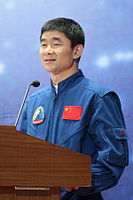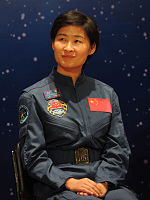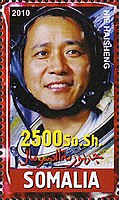China Manned Space Agency
| 中国载人航天工程办公室 | |
 | |
| Agency overview | |
|---|---|
| Formed | June 1993[1] |
| Agency executives |
|
| Parent agency | Equipment Development Department of the Central Military Commission |
| Website | en |
China Manned Space Agency (Chinese: 中国载人航天工程办公室) is an agency of the People's Republic of China responsible for the administration of China Manned Space Program,[2] the Chinese human spaceflight program. The agency is under the Equipment Development Department of the Central Military Commission.
Name
The native name of the organization (Chinese: 中国载人航天工程办公室) was initially translated into English as China Manned Space Engineering Office (CMESO) as of 2014.[3] However, ever since 2015, the name China Manned Space Agency (CMSA) has been used in official statements and news-releases till date.[4][5] It is also the name displayed on the official website of China Manned Space Program.[2]
Functions
China Manned Space Agency represents the Chinese government to take management responsibilities for the China Manned Space Program.[6]
CMSA's functions including development strategy, planning, overall technology, research and production, infrastructure construction, flight missions organization and implementation, utilization and promotion, international cooperation and news-release, etc.[2]
Organizational structure
CMSA consists of the following divisions:[2]
- Integrated Planning & Management Division
- Scientific Program & Quality Control Division
- Utilization & Development Division
- Infrastructure Construction Division
- System Division
Taikonauts
As of May 2023, eighteen Chinese taikonauts have traveled to space (in alphabetical order):
-
Cai Xuzhe (蔡旭哲)
-
Chen Dong (陈冬)
-
Deng Qingming (邓清明)
-
Fei Junlong (费俊龙)
-
Gui Haichao (桂海潮)
-
Jiang Xinlin (蒋新林)
-
Jing Haipeng (景海鹏)
-
Liu Boming (刘伯明)
-
Liu Wang (刘旺)
-
Liu Yang (刘洋)
-
Nie Haisheng (聂海胜)
-
Tang Hongbo (汤洪波)
-
Tang Shengjie (唐胜杰)
-
Wang Yaping (王亚平)
-
Yang Liwei (杨利伟)
-
Ye Guangfu (叶光富)
-
Zhai Zhigang (翟志刚)
-
Zhang Lu (张陆)
-
Zhang Xiaoguang (张晓光)
-
Zhu Yangzhu (朱杨柱)
International cooperation
In 2016, United Nations Office for Outer Space Affairs (UNOOSA) and CMSA agreed to increased space cooperation via opportunities on-board China's future space station.[5]
In 2018, UNOOSA and CMSA invited the applications from United Nations Member States to conduct experiments on-board China's Space Station.[7]
On 12 June 2019, UNOOSA and CMSA announced the winners of the selected experiments to be boarded onto the space station.[8][9]
References
- ^ "办公室介绍". cmse.gov.cn. Archived from the original on 11 July 2021. Retrieved 11 July 2021.
- ^ a b c d "CMSA_CHINA MANNED SPACE". China Manned Space. Archived from the original on 11 August 2020. Retrieved 11 July 2021.
- ^ "Space Science Experiment Design Competition for Hong Kong Secondary School Student Officially Opened in Hong Kong". China Manned Space. 23 October 2014. Retrieved 11 July 2021.
- ^ "Remarks at the Second Press Conference of Tiangong I & Shenzhou X Manned Space Program". China Manned Space. 2 April 2015. Retrieved 11 July 2021.
- ^ a b "United Nations and China agree to increased space cooperation". United Nations Office for Outer Space Affairs. 16 June 2016. Archived from the original on 22 June 2016. Retrieved 11 July 2021.
- ^ "Management_CHINA MANNED SPACE". China Manned Space. Archived from the original on 3 May 2021. Retrieved 11 July 2021.
- ^ "United Nations and China invite applications to conduct experiments on-board China's Space Station". United Nations Office for Outer Space Affairs. 28 May 2018. Archived from the original on 3 June 2018. Retrieved 11 July 2021.
- ^ "UNOOSA and CMSA announce winners of opportunity to fly experiments on board China Space Station". United Nations Office for Outer Space Affairs. United Nations Office for Outer Space Affairs. 12 June 2019. Archived from the original on 16 February 2020. Retrieved 11 July 2021.
- ^ "China Space Station". United Nations Office for Outer Space Affairs. United Nations Office for Outer Space Affairs. 12 June 2019. Archived from the original on 30 April 2021. Retrieved 11 July 2021.



















